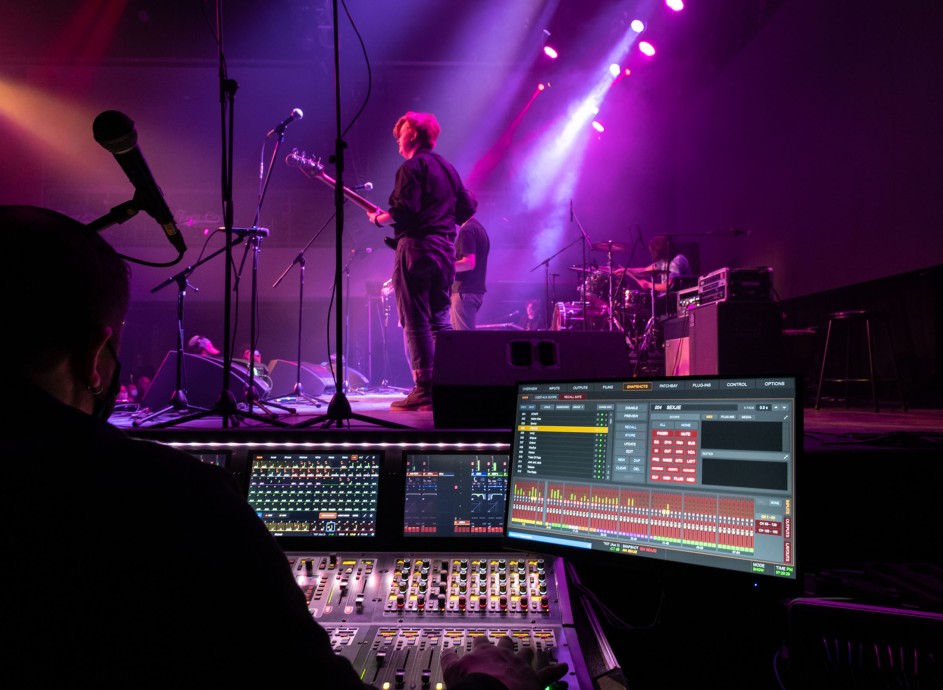Music Industry Arts

*Domestic applicants include Canadian citizens, permanent residents, protected persons and Convention refugees.
Our graduates are among some of the world’s best producers and performers for over 40 years, including Oscar, JUNO (Fanshawe JUNO playlist) and Primetime Emmy winners. As a student, you’ll access this growing network of graduates in addition to connecting with industry leaders at Canadian Music Week. Guest lectures, master classes and workshops with artists-in-residence will also equip you with extensive knowledge of the latest technology and business expertise.
The Music Industry Arts program focuses on fine-tuning your skills into a rewarding career. You’ll study and practice your skills in the most modern recording facility of any school in Canada. You’ll also apply your learning by organizing and performing in the annual Share the Land charity concert, a favourite event for many graduates.
The City of London, together with the Canadian Commission for the United Nations Educational, Scientific and Cultural Organization (UNESCO), is proud to announce that London has been designated a UNESCO City of Music. London is Canada's first city to receive this designation.
The Music Industry Arts program is a creative and practical environment that allows students to discover and develop the artistic, technical and business skills that will prepare them to compete in today's evolving music and entertainment industry.
The program approach is intensively hands-on, with professional recording, performance and lab facilities exclusively dedicated to student use. Course content is varied and equally balanced between artist development and technical skills which accentuates experiential learning within the program. Course curricula is wide by design and includes: artist development, music publishing, entertainment law, copyright, sales and promotion, music theory, ear training, music writing and arranging, creative audio production techniques, functions of digital and analog consoles, audio recording/mixing, studio operation, design and management, audio for picture, as well as live audio production. Computer literacy, audio and editing techniques relevant to the disciplines of music creation and audio post-production are offered through theory and practical applications. Collaborative projects utilizing other media-based programs within the college are also encouraged on a regular basis.
Due to the academic rigor required in the Music Industry Arts program, applicants applying directly to this program from secondary school without additional post-secondary education, are encouraged to consider applying to the Pre-Media preparatory program.
Graduates of Fanshawe’s Music Industry Arts program have the knowledge and skills to pursue a career in the music production/recording industry, the post-production field or music business industries, including:
Did you know Fanshawe consistently ranks high in graduation employment rates among large colleges in Ontario?
Here are some examples of career opportunities for graduates of Fanshawe’s Music Industry Arts program:
Assistant Recording Engineer
Responsible for assisting the head engineer in a recording studio.
Artist Marketing Manager
Develop strategies and initiatives to promote an artist’s upcoming release.
Music Production/Copywriter
Have a passion for sound and music and want to build a career in a creative environment.

MIA was all-inclusive in the actual knowledge part - how to mix, how to master, how to mic certain types of signal - but the biggest contribution to my success was learning to network, build contacts and take past learnings and applying them to future moves. As an artist whose musicianship is quickly turning into a career, I'm grateful for the stepping stones in my journey!
*In September 2019, Haviah was awarded the Polaris Music Prize, one of the Canadian music industry's most prestigious honours.


“MIA was the first program of its kind in Canada 50 years ago. It would be hard to go anywhere in Canada and not find an MIA grad working in the industry as an engineer, producer, writer, publisher, record company president, or performer. We are very proud of our rich history. With the influx of artists in MIA in the past decade we have created a mini music industry for our students to collaborate with each other, and to give them the best experience at Fanshawe before entering the industry.”
Dan Brodbeck
Program Coordinator & Professor, Music Industry Arts
Juno Award Winner for Recording Engineer
2020 Grammy Nominee for Best Rock Album
The graduate has reliably demonstrated the ability to
1. Display positive and professional attitude towards the responsibility and respect for the creation of music and sound.
2. Meet strict deadlines and enhance creativity through the act of balancing technology and arts.
3. Apply market ready skills in: music and sound recording, preproduction, audio production, writing, arranging, editing, mixing, contracting, and delivering, artist discovery, development, direction, marketing, promotion, tour management and live sound production.
4. Utilize strong time management, problem solving and organizational skills.
5. Stay current with industry practices primarily in the technical and secondarily in non-technical audio industry sectors through the use of creating sound and music.
6. Operate audio and video hardware and software through the creation and design of sound and music either with or without moving or still pictures.
7. Apply industry level skills in the operation of live sound and music recording.
8. Create all documentation necessary in order to develop a music artist.
Dan Brodbeck
Ontario Secondary School Diploma (OSSD), or equivalent, or a mature applicant with the following course:
- Grade 12 English (C or U).
- In addition to meeting the academic course requirements, applicants must make a supplemental application involving a music recording. Applicants will be sent an email with instructions for completion.
Students who do not meet the admission requirements are recommended for academic upgrading. A conditional offer may be possible with proof of enrolment. Alternatively, applicants missing the required courses may want to consider our one-year Pre-Media Preparatory Program. Upon graduation, applicants meet all the admission requirements and have had some exposure to most programs in the School of Arts & Language.
This is a competitive program; the number of qualified applicants exceeds the number of seats available. Please see www.fanshawec.ca/hcp for details. |
| Test | Score |
|---|---|
| TOEFL iBT | 79 |
| IELTS Academic | Overall score of 6.0 with no score less than 5.5 in any of the four bands |
| CAEL | Overall score of 60 with no score less than 50 in any of the four bands. score of 80 in listening |
| PTE Academic | 53 |
| Cambridge English | Overall score of 169 with no language skill less than 162 |
| ESL4/GAP5 | Minimum grade of 80% in Level 8, 75% in Level 9, or 70% in Level 10 |
| Duolingo | Overall score of 105, with no score lower than 95 |
| LANGUAGECERT | Overall score of 65 with no score less than 60 in any of the four skills |
| Level 1 | ||||
| Take all of the following Mandatory Courses: | ||||
Group 1 | ||||
| WRIT-1037 | Reason & Writing 1-Contemporary Media | 3 | ||
| This course will introduce contemporary media students to essential principles of reading, writing, and reasoning at the postsecondary level. Students will identify, summarize, analyze, and evaluate multiple short readings and write persuasive response essays to develop their vocabulary, comprehension, grammar, and critical thinking. | ||||
| PROD-1063 | Audio Workstation 1 | 1 | ||
| An introductory course that focuses on the basics of audio editing, synthesis and production using ProTools. This course identifies and introduces production techniques used in current music software production. | ||||
| MUSC-1011 | Music, Writing & Analysis 1 | 3 | ||
| This course will offer the student the skills needed to bridge the gap between music theory and its application to current musical environments, both in the recording studio and live performance. This course will also examine a history of popular music in North America in the 20th century, with a focus on those aspects relevant to the development of the commercial music industry in Canada and the U.S. This semester covers the period from the development of early Blues in the American south to the masters of instrumental and vocal styles and current trends including musical theater productions. | ||||
| PROD-1061 | Music Production 1 | 2 | ||
| This course is designed to give the student a theoretical and practical working knowledge of music production and the role of the music producer/artist developer in a current recording environment | ||||
| MUSC-1014 | Artist Development 1 | 2 | ||
| A study of the major creative and business components that form the foundation of today's music industry with an emphasis on how they are interconnected and interdependent. | ||||
| PROD-1059 | Social Media & Performance 1 | 2 | ||
| This course will introduce the student to various topics in the music industry with an artist development/management perspective. Topics include income streams for artists as well as contracts and contract negotiations through the study of the manager/artist relationship. The student will also get hands on experience with artist performance and performance critique. | ||||
| RCRD-1018 | Audio Engineering Lab 1 | 1.5 | ||
| This course is designed to provide the student with theoretical and practical knowledge of the modern recording studio. Upon completion of this course, each student will be able to properly use microphones, process them through the recording console, utilize various pieces of signal processing equipment and mix in a stereo analog / digital format. | ||||
| PROD-1064 | Audio Workstation Theory 1 | 1 | ||
| This course provides a comprehensive introduction to the fundamental concepts and principles behind Digital Audio Workstations (DAWs). Students will explore the core functions of DAWs, including audio recording, editing, mixing, and production techniques. | ||||
[1] Total program costs are approximate and subject to change. They do not include additional fees such as the health and dental plan, bus pass, or general expenses. Learn more about ancillary and additional fees.